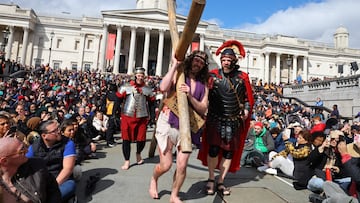CELEBRATIONS
Why do we not eat meat on Good Friday? The origin of the Friday fast
Abstaining from meat on Good Friday is a tradition steeped in history serving as a reminder of Jesus’ sacrifice and a call for personal reflection.

Christians don’t just observe the Friday fast at Easter, throughout Lent it is observed. The idea of the tradition is that Jesus sacrificed his own flesh on Good Friday and thus meat is given up in substitute. The origins of the Friday fast can be traced back to the early days of Christianity, likely stemming from existing Jewish traditions of fasting on holy days.
It marks the day Jesus was crucified, a day of immense suffering and sacrifice. By abstaining from meat, a source of sustenance and often considered a luxury, Christians aimed to share in a small way the sacrifice Jesus made for humanity. This act of self-denial served as a reminder of Jesus’ pain and the profound meaning of his death.
The evolution of the practice
Over time, the practice of fasting on Fridays evolved. Initially, it might have involved abstaining from all food and drink until the evening. However, as Christianity spread, the practice became more nuanced. The concept of abstinence, which allowed for the consumption of certain foods but not meat, emerged. This shift made the practice more accessible to a wider population, particularly those engaged in manual labor who couldn’t sustain themselves on a complete fast.
The specific foods excluded during the Friday fast also varied. Traditionally, meat from land animals (beef, pork, poultry) was prohibited. Fish, as it was not considered “flesh” in the same way, was allowed. This contributed to a huge fish market in medieval and early modern Europe where it was required every week, no matter the location.
The Catholic Church traditionally mandates abstinence from meat on all Fridays of the year, with Good Friday holding a particular emphasis. Eastern Orthodox Christians often observe a stricter fast on Good Friday, abstaining from all animal products, including dairy and eggs. Protestant denominations may have less formalised practices, with some encouraging abstinence from meat on Good Friday while others leave it to individual choices.






